人教版八年级英语下册Unit 3 Could you please clean your room? Section B 词汇讲解 课件 (共18张PPT)
文档属性
| 名称 | 人教版八年级英语下册Unit 3 Could you please clean your room? Section B 词汇讲解 课件 (共18张PPT) | 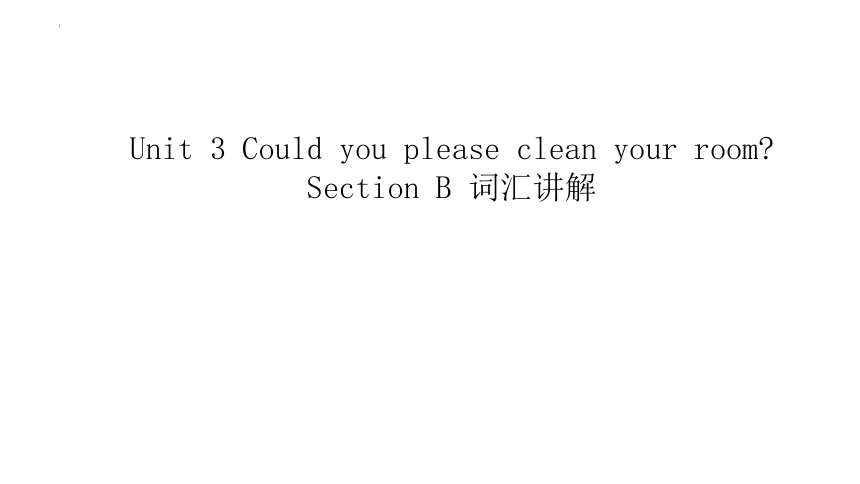 | |
| 格式 | zip | ||
| 文件大小 | 159.3KB | ||
| 资源类型 | 教案 | ||
| 版本资源 | 人教新目标(Go for it)版 | ||
| 科目 | 英语 | ||
| 更新时间 | 2022-03-03 13:54:45 | ||
图片预览

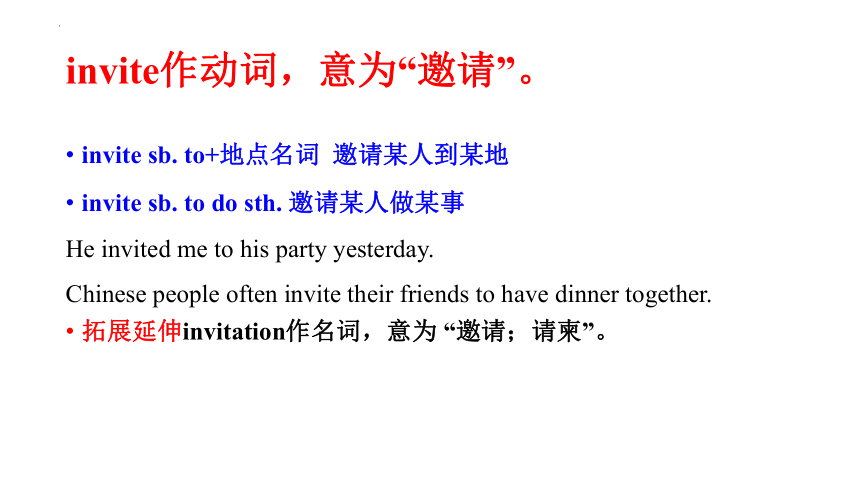
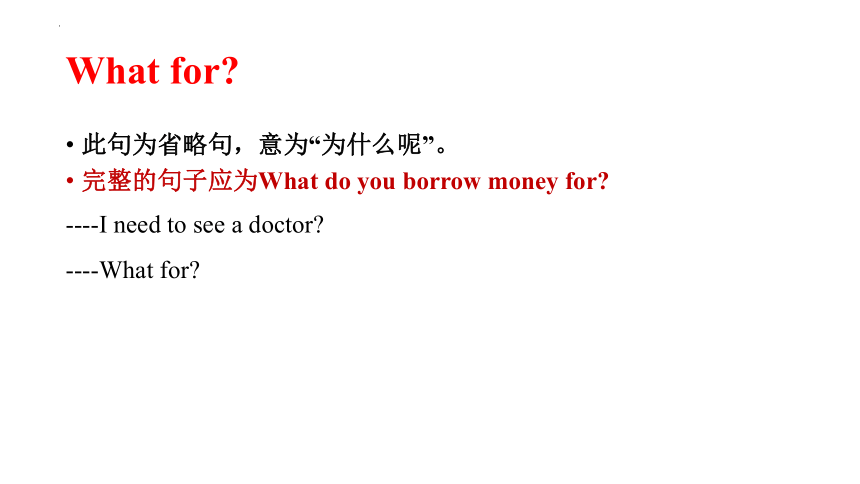
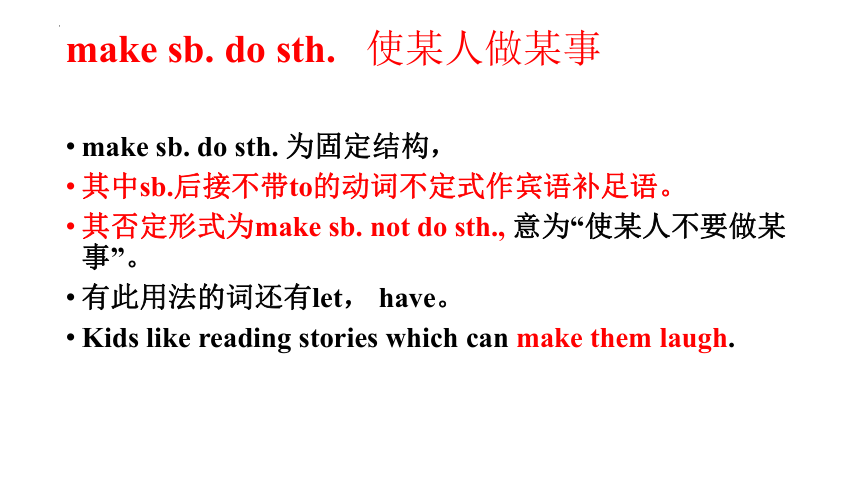
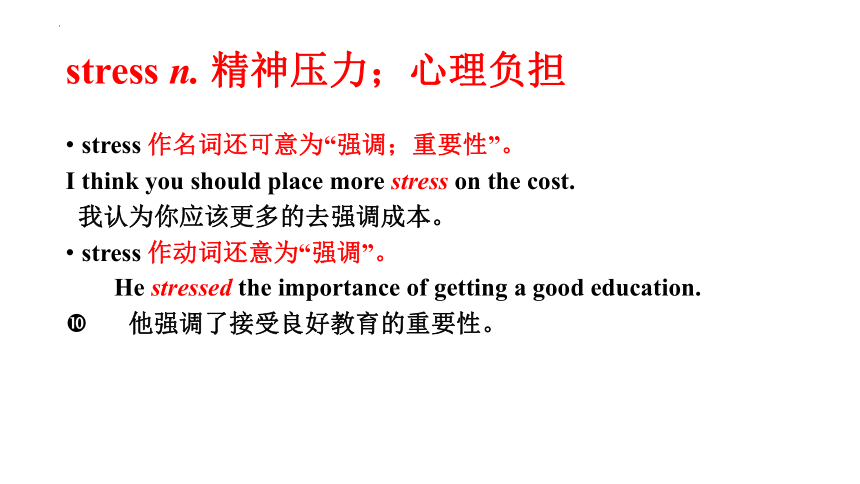
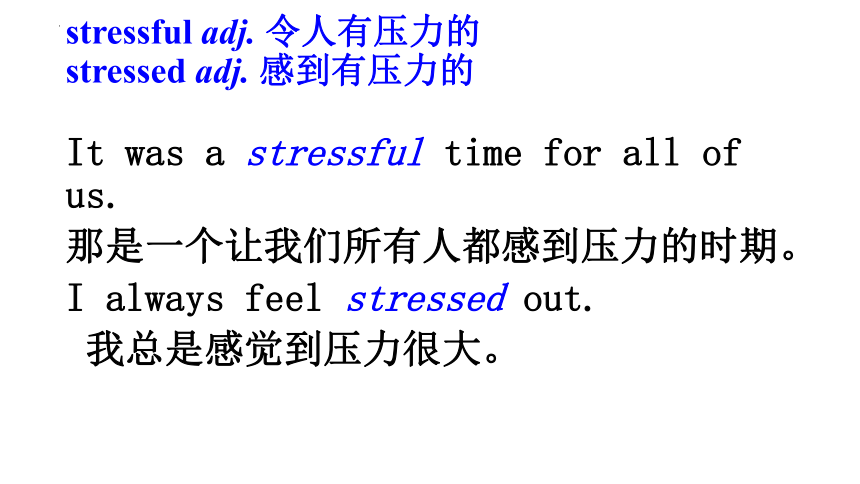
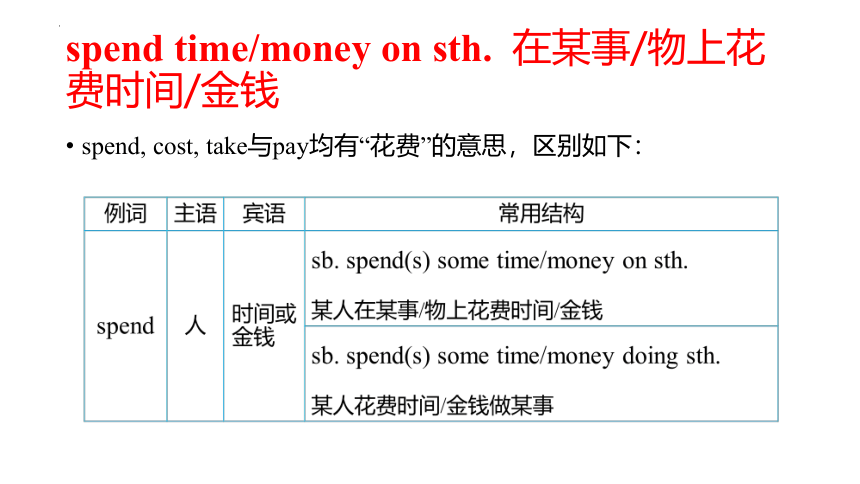
文档简介
(共18张PPT)
Unit 3 Could you please clean your room
Section B 词汇讲解
invite作动词,意为“邀请”。
invite sb. to+地点名词 邀请某人到某地
invite sb. to do sth. 邀请某人做某事
He invited me to his party yesterday.
Chinese people often invite their friends to have dinner together.
拓展延伸invitation作名词,意为 “邀请;请柬”。
What for
此句为省略句,意为“为什么呢”。
完整的句子应为What do you borrow money for
----I need to see a doctor
----What for
make sb. do sth. 使某人做某事
make sb. do sth. 为固定结构,
其中sb.后接不带to的动词不定式作宾语补足语。
其否定形式为make sb. not do sth., 意为“使某人不要做某事”。
有此用法的词还有let, have。
Kids like reading stories which can make them laugh.
stress n. 精神压力;心理负担
stress 作名词还可意为“强调;重要性”。
I think you should place more stress on the cost.
我认为你应该更多的去强调成本。
stress 作动词还意为“强调”。
He stressed the importance of getting a good education.
他强调了接受良好教育的重要性。
stressful adj. 令人有压力的
stressed adj. 感到有压力的
It was a stressful time for all of us.
那是一个让我们所有人都感到压力的时期。
I always feel stressed out.
我总是感觉到压力很大。
spend time/money on sth. 在某事/物上花费时间/金钱
spend, cost, take与pay均有“花费”的意思,区别如下:
in order to 目的是;为了
in order to表示目的,后接动词原形,
其否定形式为in order not to。
In order to finish the report, he stayed up very late.
Jenny will get up earlier than usual in order to catch the first bus.
in order that也表示“为了”,其后接从句。有时可与in order to 进行转换。
He raised his voice in order that we could hear him clearly.
I worked hard in order that I could get good grades.
= I worked hard in order to get good grades.
there is no need for sb. to do sth.
对某人来说没有必要做……
It hardly rains here, so there is no need for me to buy an expensive umbrella.
There is no need for them to explain the reason to anyone.
It's+名词+ to do sth. 其中it为形式主语,真正主语为to do sth.
It's everyone's duty to keep the environment clean and tidy.
provide v.提供
【相关短语】
provide sb. with sth.
provide sth. for sb.
为某人提供某物
anyway 是个副词
,置于句首时,其后常常用逗号与其他成分隔开。意为“反正,仍然,依然”。
Sam didn’t get the job, but he is not unhappy because it didn’t pay well anyway.
anyway还可以表示“不管怎样,无论如何”。
It’s just a cold. But anyway you should still see the doctor.
since conj. 因为;既然
prep., conj. & adv. 从……以后;自……以来
(1) since在此处作连词,意为“因为;既然”,引导原因状语从句,常位于句首。
Since you don't know the boy, I'll ask someone else.
(2) since作连词,还可意为“从……以后;自……以来”,其引导的时间状语从句常用一般过去时,主句多用现在完成时。
Mary has lived here since she was five.
(3) since作介词,意为“从……以后;自……以来”,后接表示时间点的词或短语。
She has been here since three o'clock this morning.
(4) since作副词,意为“从……以后;自……以来”,常与现在完成时连用。
She left here ten years ago, and I haven't seen her since.
“the +比较级+...... ,the +比较级+...... ”表示
“越……,就越……”。如:
The more he explained,
the better we understood.
他解释得越多,我们就理解得越透彻。
fair adj. 合理的;公正的
unfair adj. 不合理的;不公正的
fair 作形容词,还可意为“白皙的;浅色的;天气晴朗的”:
She has long fair hair. 她有一头浅色长发。
a fair and breezy day 风和日丽的一天
fair n. 展览会;商品交易会
a book fair 图书交易会
Unit 3 Could you please clean your room
Section B 词汇讲解
invite作动词,意为“邀请”。
invite sb. to+地点名词 邀请某人到某地
invite sb. to do sth. 邀请某人做某事
He invited me to his party yesterday.
Chinese people often invite their friends to have dinner together.
拓展延伸invitation作名词,意为 “邀请;请柬”。
What for
此句为省略句,意为“为什么呢”。
完整的句子应为What do you borrow money for
----I need to see a doctor
----What for
make sb. do sth. 使某人做某事
make sb. do sth. 为固定结构,
其中sb.后接不带to的动词不定式作宾语补足语。
其否定形式为make sb. not do sth., 意为“使某人不要做某事”。
有此用法的词还有let, have。
Kids like reading stories which can make them laugh.
stress n. 精神压力;心理负担
stress 作名词还可意为“强调;重要性”。
I think you should place more stress on the cost.
我认为你应该更多的去强调成本。
stress 作动词还意为“强调”。
He stressed the importance of getting a good education.
他强调了接受良好教育的重要性。
stressful adj. 令人有压力的
stressed adj. 感到有压力的
It was a stressful time for all of us.
那是一个让我们所有人都感到压力的时期。
I always feel stressed out.
我总是感觉到压力很大。
spend time/money on sth. 在某事/物上花费时间/金钱
spend, cost, take与pay均有“花费”的意思,区别如下:
in order to 目的是;为了
in order to表示目的,后接动词原形,
其否定形式为in order not to。
In order to finish the report, he stayed up very late.
Jenny will get up earlier than usual in order to catch the first bus.
in order that也表示“为了”,其后接从句。有时可与in order to 进行转换。
He raised his voice in order that we could hear him clearly.
I worked hard in order that I could get good grades.
= I worked hard in order to get good grades.
there is no need for sb. to do sth.
对某人来说没有必要做……
It hardly rains here, so there is no need for me to buy an expensive umbrella.
There is no need for them to explain the reason to anyone.
It's+名词+ to do sth. 其中it为形式主语,真正主语为to do sth.
It's everyone's duty to keep the environment clean and tidy.
provide v.提供
【相关短语】
provide sb. with sth.
provide sth. for sb.
为某人提供某物
anyway 是个副词
,置于句首时,其后常常用逗号与其他成分隔开。意为“反正,仍然,依然”。
Sam didn’t get the job, but he is not unhappy because it didn’t pay well anyway.
anyway还可以表示“不管怎样,无论如何”。
It’s just a cold. But anyway you should still see the doctor.
since conj. 因为;既然
prep., conj. & adv. 从……以后;自……以来
(1) since在此处作连词,意为“因为;既然”,引导原因状语从句,常位于句首。
Since you don't know the boy, I'll ask someone else.
(2) since作连词,还可意为“从……以后;自……以来”,其引导的时间状语从句常用一般过去时,主句多用现在完成时。
Mary has lived here since she was five.
(3) since作介词,意为“从……以后;自……以来”,后接表示时间点的词或短语。
She has been here since three o'clock this morning.
(4) since作副词,意为“从……以后;自……以来”,常与现在完成时连用。
She left here ten years ago, and I haven't seen her since.
“the +比较级+...... ,the +比较级+...... ”表示
“越……,就越……”。如:
The more he explained,
the better we understood.
他解释得越多,我们就理解得越透彻。
fair adj. 合理的;公正的
unfair adj. 不合理的;不公正的
fair 作形容词,还可意为“白皙的;浅色的;天气晴朗的”:
She has long fair hair. 她有一头浅色长发。
a fair and breezy day 风和日丽的一天
fair n. 展览会;商品交易会
a book fair 图书交易会
同课章节目录
- Unit 1 What's the matter?
- Section A
- Section B
- Unit 2 I'll help to clean up the city parks.
- Section A
- Section B
- Unit 3 Could you please clean your room?
- Section A
- Section B
- Unit 4 Why don't you talk to your parents?
- Section A
- Section B
- Unit 5 What were you doing when the rainstorm came
- Section A
- Section B
- Review of Units 1-5
- Unit 6 An old man tried to move the mountains.
- Section A
- Section B
- Unit 7 What's the highest mountain in the world?
- Section A
- Section B
- Unit 8 Have you read Treasure Island yet?
- Section A
- Section B
- Unit 9 Have you ever been to a museum?
- Section A
- Section B
- Unit 10 I've had this bike for three years.
- Section A
- Section B
